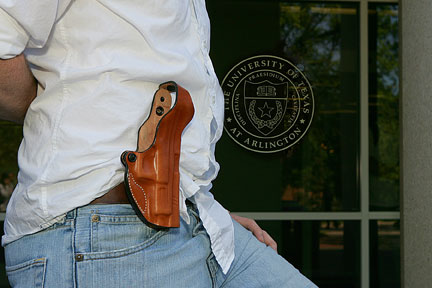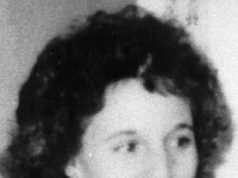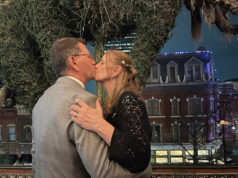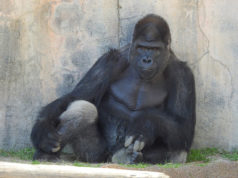Two generations ago, the protests on college campuses were about making love, not war, and one of the most radical groups went by the acronym of SNCC, the Student Nonviolent Coordinating Committee. But on North Texas college campuses and at Texas’ state capital in recent weeks, some of the most interesting student activism has involved, instead, a “shoot back, don’t get shot” movement.
This time around, the relevant initials are SCCC, Students for Concealed Carry on Campus, and the issue is whether or not college students should be allowed to carry concealed handguns to class.
 A national movement to permit concealed weapons on college campuses started in North Texas two years ago, immediately following the tragedy at Virginia Tech, in which one mentally unbalanced young man killed 32 people and wounded 17 others. In 17 states, legislation was proposed after that to allow concealed handguns on campuses but was defeated in every case.
A national movement to permit concealed weapons on college campuses started in North Texas two years ago, immediately following the tragedy at Virginia Tech, in which one mentally unbalanced young man killed 32 people and wounded 17 others. In 17 states, legislation was proposed after that to allow concealed handguns on campuses but was defeated in every case.
Now, with legislation pending in both houses of the Texas Legislature to allow concealed-carry at public colleges, activism on the issue by SCCC and others is heating up. Opposition groups, such as Students for Gun Free Schools in Texas, have fewer members around the state but are taking an active role in Austin – and like SCCC two years earlier, are leading the charge nationally from a Texas base.
The bills have yet to make it to the floor of either the House or Senate. The House version has been passed out of committee and has enough co-sponsors to win a floor vote, but thus far it’s still in the Calendars Committee, a place where many bills die near the end of the legislative session. The measures are opposed, according to news reports, by administrators and police officials at most Texas colleges.
John Woods, now a graduate student at the University of Texas at Austin, was a student at Virginia Tech at the time of the shooting and lost his girlfriend in the tragedy. Now he’s taking a major role in opposing the concealed-carry measures, including organizing a recent protest at the Texas Capitol.
At UT-Arlington and other Texas campuses, SCCC has organized “empty holster” demonstrations, in which students walk around campus wearing empty holsters to illustrate their view that they are defenseless on campus without handguns.
Amy Sheldon, a nursing student at UTA, didn’t really notice the empty holsters until they were pointed out to her, but she said it made her feel uneasy to think of concealed weapons on campus.
Opponents of the campus-carry bills haven’t been as visible in North Texas, but in Austin, Woods said, the student government has gone on record opposing the legislation. A rally by student groups against the legislation drew about 300 people to the steps of the capitol.
“Unfortunately, the bill made it out of committee, which surprised everyone,” Woods said. After that, he said, “we got worried.” Still, “If it doesn’t make it to the House floor in 10 days, it won’t get through,” he said Monday.
Proponents maintain that allowing students, faculty, and staff to carry concealed weapons on college campuses might mean that, should another crazed killer start shooting, others would be able to shoot back without waiting for law enforcement personnel to arrive, perhaps saving lives. To those opposed to the idea, the prospect of guns being carried by young people who are experiencing a combination of high stress, high availability of alcohol, and the removal of parental supervision for the first time in their lives doesn’t sound like an increase in safety.
Tom McEnroe, a leader of the 50-member SCCC chapter at UT-Arlington, said he thinks those against the legislation bring too much emotion into the argument.
But Woods has a different view. “This is something that university police do not want,” he said. “They [proponents of guns on campus] really haven’t done their research at all.”
Students for Gun Free Schools in Texas has about 1,160 members, Woods said, with about three-fourths of those at UT-Austin.
Andy Pelosi, who works with Woods in the effort to keep guns off campuses, said that students in Austin are leading the effort nationwide. His group, Gun Free Kids, is working with Students for Gun Free Schools and the North Texas Brady Campaign to organize colleges across the country.
Nationally and locally, SCCC spreads the word of its activities mostly through Facebook. The national group now claims 36,000 members in 350 chapters across the country.
At UT-Arlington last month, SCCC organized its third empty-holster protest along with the College Republicans. Members gathered signatures on a petition supporting the pro-gun legislation to give to State Rep. Diane Patrick, who represents the Arlington campus, said Matt Foster, president of the UTA chapter of the College Republicans.
“It was basically to show her that there are plenty of people on campus who support the bill,” he said. About 100 students from various groups participated in the protest, he said.
SCCC’s web site lists its two main functions as educating the public about concealed-carry and exerting pressure on legislators. College campuses for the most part are considered gun-free zones, and currently only 11 campuses in the country allow weapons.
McEnroe said that at those 11 campuses, there has never been a shot fired by a concealed-gun license holder.
“There were 30 people killed after the police responded at Virginia Tech,” he said. The number of people affected by the change to the current law would be minimal, he said, since a person must be 21 to receive a concealed-handgun license, after undergoing a background check and 10 to 15 hours of training.
McEnroe said the Texas State Rifle Association and the NRA support the SCCC and have helped substantially with their movement. The SCCC web site says the group is not affiliated with the NRA and receives no financial support from the association.
Woods said there are no provisions in the current guns-on-campus bills that would ban weapons at places like campus bars, the chemical engineering lab, or at pre-school and child-care facilities. “There are a lot of things in the bill that aren’t covered that should be,” he said. “These kinds of things should be taken into account.”
The concealed-carry-on-campus bills were introduced by State Sen. Jeff Wentworth of San Antonio and State Rep. Joe Driver of Garland, both Republicans. Driver said the bills were filed in response to school shootings such as the one at Virginia Tech, the deadliest school shooting to date. Before that, the 1966 sniper shootings at the University of Texas at Austin had been the most deadly. In that tragedy, gunman Charles Whitman gained access to the UT tower and killed 16 people and wounded 31 others before he was in turn killed. It was later learned that he killed his wife and mother earlier that morning.
Driver said he’s gotten very little negative feedback once he explains what the bill actually does. He has 75 co-authors in the House and Wentworth has 13 in the Senate.
Wentworth said he believes people have the right to protect themselves. “It’s about self-protection and self-defense,” he said. “I don’t want to wake up and hear that 32 Texas kids have been shot and killed. We make them unarmed, defenseless, vulnerable sitting ducks.”
State Rep. Lon Burnam said he thinks the bills are a terrible idea, based on speculation about possible future school shootings. He said supporters’ intentions are good but misguided. “There are too many instances where that [students carrying weapons] is more of an endangerment than an enhancement,” the Fort Worth Democrat said. “I don’t think our campuses need to be armed camps.”
UT-Arlington president James Spaniolo declined to comment, as did police officials on that campus.
Alejandro del Carmen, associate professor and chair of the criminology department at UTA, said he believes that allowing individual license holders to carry a gun on campus may give people a better sense of security. He said it is difficult to predict whether an armed student body would actually be safer.
“Campus attacks don’t happen with a great deal of frequency; therefore it is difficult to measure if in fact police would be delayed in responding. Having said that, it may deter an individual from shooting at large crowds if in fact he/she is aware that someone may be carrying a weapon,” he said.
Eight other states are also considering legislation this year to allow guns on college campuses.
Cohe Bolin can be reached at cohe30@gmail.com.











